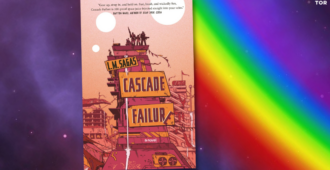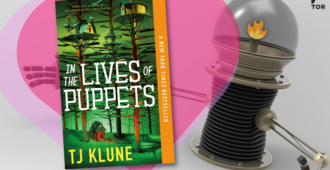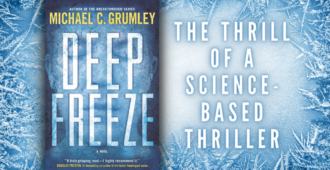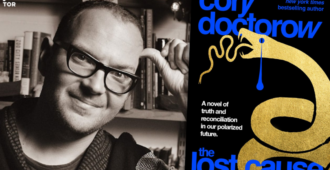 By Col Buchanan
By Col Buchanan
Escapism is bad for you. It’s unhealthy and immature and leads to a lack of bathing.
I’m fairly certain you’ve come across this particular sentiment before, maybe not the bathing part, but the rest of it. Hell, maybe even the bathing part too. People who hold this viewpoint tend to look poorly upon the imagined realms of fantasy and SF—and even more so in regards to their fans. Yes—because we’d rather poke a stick at the human condition from the vantage of Mars or Westeros than from the kitchen sink, because we like to cast our imaginations as far as we can, because we like to go wow along the way, we’re all somehow squandering our precious time on this Earth.
My response to this is usually to acknowledge the most obvious point first—that it’s a lot of fun losing yourself for a while in a fantasy setting. Yet escapism, for me, means a great deal more than this. In truth, we don’t always find ourselves in circumstances of our own making. And trying to escape from bad circumstances, whether inwardly or outwardly, is a perfectly human reaction.
I’m speaking of course from personal experience here.
I grew up during the Troubles in Northern Ireland. Dyslexic. Fairly lonely. One of those quiet kids who looks out at the world with something bordering on disbelief. My school years were an incarceration that I couldn’t wait to be free from. Home life was the same. Circumstances I could either physically run away from or find some way to bear.
Thankfully I found fantasy and science fiction at an early age. Or they found me, as it sometimes seems with these things. And they were a serious gift back then—these stories that allowed me to escape into a different world than my own. While brothers took to drinking alcohol on the streets, I locked myself in my room and read of imagined places, and when that wasn’t enough, invented and wrote of them too. I was like Sebastian in The Neverending Story. Same hair too.
Since then, this passion for escapism has been a constant theme throughout my life. And it really has been a life-saver. No matter how bad life may have been at times, the load has always been lightened by these temporary escapes of the mind. The result has been Farlander—my grown-up take on the fantasy adventure stories that thrilled me so much as a youth. For several years now I’ve been living part-time in the Heart of the World, the setting for the book, and having great fun sending my protagonists head-long through this fantasy landscape.
The fun, however—it has to be said—has been tempered by my real-life experiences of growing up under those earlier conditions that I mentioned. The escapism of youth was a necessity for many reasons, and they’ve shaped Farlander as much as its fantasy nature has. My empathy is strong for those who live under conditions they want to, but cannot, escape from. So I write always with an eye cast towards those circumstances in this world, our common world—which is why the Heart of the World is in many ways an echo of our real world, our history and our future. This is also why I’m interested in the dynamics of power and liberty; of oppressive ideologies; of what it is to live a free life, what constraints always face us. And it’s why I write about the destitute, the exiled, the enslaved, and the soon-to-be enslaved, as much as I write about the Beggar Kings, the Caliphs, and the monstrously wealthy.
From my own standing, there’s no better way of exploring the issues of liberty than through the release of escapism—a medium that was, for me, a means of breaking out of a cage not of my own making. And in truth that has remained the underlying reason for my love for fantasy and SF to this day. The celebration of freedom they both entail.
In the much more elegant words of JRR Tolkien:
“Fantasy is escapist, and that is its glory. If a soldier is imprisoned by the enemy, don’t we consider it his duty to escape? … If we value the freedom of mind and soul, if we’re partisans of liberty, then it’s our plain duty to escape, and to take as many people with us as we can!”
Col Buchanan’s debut novel, Farlander (ISBN: 978-0-7653-3105-2 / ISBN10: 0-7653-3105-5 / $24.99), will be available in January 2010 from Tor Books.
From the Tor January 2011 newsletter.






